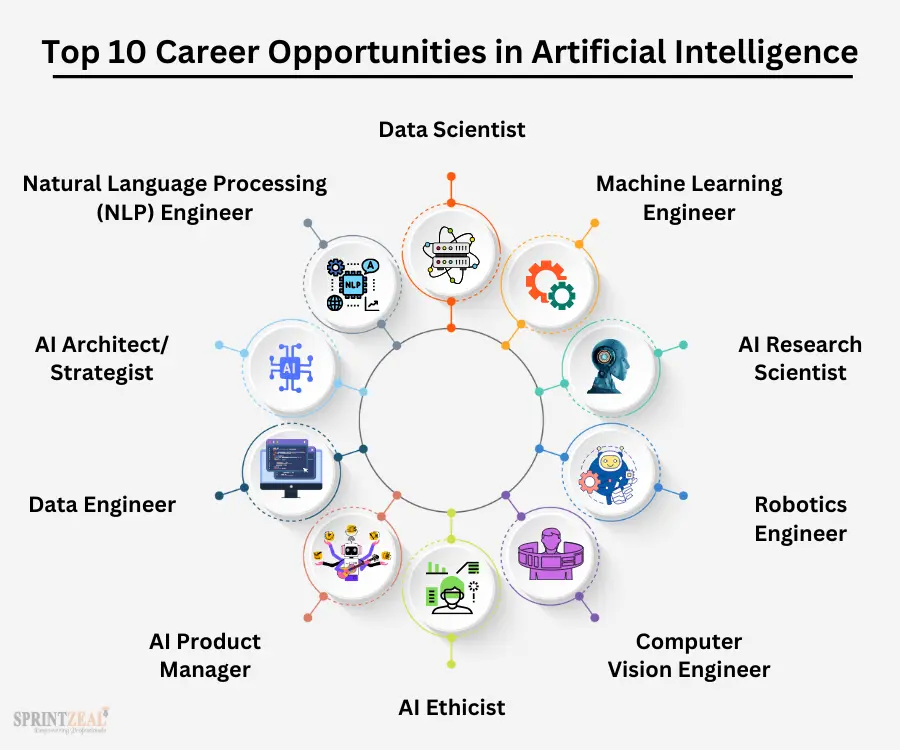Top 10 Career Opportunities in Artificial Intelligence
-
 By Niharika Chaurasia
By Niharika Chaurasia - Published on Oct 5 2023

Table of Contents
Future of AI
Picture a realm where machines absorb knowledge, apply logical thinking, and adjust effortlessly – a realm where technology not merely obeys human directives but predicts our requirements. This is the forthcoming landscape that Artificial Intelligence (AI) is crafting, and its influence is echoing through various sectors. From healthcare breakthroughs to precision manufacturing, AI is transforming how we live and work. But this transformation isn't just confined to machines; it's also reshaping career landscapes.
As AI becomes the heartbeat of modern innovation, the demand for professionals who can navigate its complexities is soaring. This blog unravels the captivating future of AI careers, where each role is a gateway to pioneering change. Join us on a journey through the fast-evolving realm of AI opportunities, where your curiosity can ignite a trailblazing career. Let's dive in and discover the endless possibilities that await in the world of AI.
Top 10 Career Opportunities in Artificial Intelligence
Embarking on the realm of career opportunities in artificial intelligence opens the door to innovation and boundless potential. These roles are central to the evolution of artificial intelligence and jobs, with promises that transcend the ordinary workday.
Join us as we unveil the marvel of these top 10 AI careers, shaping the landscape of jobs for artificial intelligence and offering an exciting future in artificial intelligence jobs in the future. Explore the realm of possibilities and seize the abundant job opportunities in AI and within the extensive jobs in AI field that await.

1. Data Scientist
Job Role:
Role: Data Scientists are the modern-day detectives, deciphering complex data puzzles to uncover invaluable insights that drive business decisions.
Essential Skills:
Proficiency in Python and R programming, adeptness in machine learning, and a knack for statistical modeling.
Qualification & Certification:
A degree in Data Science and the Microsoft Certified: Data Analyst Associate certification are advantageous.
Average Salary: Typically earns between $110,000 and $150,000.
2. Machine Learning Engineer
Job Role:
Machine Learning Engineers craft algorithms that enable machines to learn and adapt from data, making them the architects of intelligent systems.
Essential Skills:
Proficiency in Python and Java programming, expertise in machine learning libraries, and algorithmic prowess.
Qualification & Certification:
A Computer Science degree and AWS Certified Machine Learning - Specialty certification are beneficial
Average Salary: Earns between $120,000 to $160,000.
3. AI Research Scientist
Job Role:
AI Research Scientists are pioneers, developing algorithms that breathe life into machines by enabling them to think and learn like humans.
Essential Skills:
Deep learning expertise, mathematical acumen, and coding proficiency are imperative.
Qualification & Certification: A Ph.D. in Computer Science is the gateway to this role.
Average Salary: The role commands an average salary of $140,000 to $180,000.
4. Robotics Engineer
Job Role:
Robotics Engineers design and build robots that perform tasks autonomously, bridging the gap between technology and real-world applications.
Essential Skills:
Proficiency in robotics programming, sensor technology, and AI understanding
Qualification & Certification: A Bachelor's degree in Robotics lays the foundation.
Average Salary: Typically earns around $100,000 to $140,000.
5. Computer Vision Engineer
Job Role:
A Computer Vision Engineers work is to give machines the power to take visual information, enabling them to "see" and understand the world.
Essential Skills:
Proficiency in computer vision, deep learning, and image processing
Qualification & Certification: Relevant degrees in computer science and certifications like OpenCV Wizardry.
Average Salary: Earns between $100,000 to $130,000.
6. AI Ethicist
Job Role:
AI Ethicists navigate the ethical dimensions of AI, ensuring its development and use aligns with human values and societal welfare.
Essential Skills:
Proficiency in ethics, AI understanding, critical thinking, and effective communication
Qualification & Certification: Prefered Master's or Ph.D. degrees in ethics and AI.
Average Salary: Earns between $90,000 and $130,000.
7. AI Product Manager
Job Role:
AI Product Managers orchestrate the creation of AI-powered products, ensuring they meet user needs while leveraging the potential of AI technology.
Essential Skills:
Proficiency in AI comprehension, project management, and effective communication.
Qualification & Certification: A Degrees in related fields and certifications like Project Management Professional (PMP).
Average Salary: Typically earns between $120,000 to $160,000.
8. Data Engineer
Job Role:
Data Engineers build and manage the infrastructure for data pipelines, ensuring seamless data flow and accessibility.
Essential Skills:
Proficiency in data processing, ETL techniques, and database mastery.
Qualification & Certification: Diplomas from Data Academies (Bachelor's/Master's in Computer Science).
Average Salary: Typically earns between $110,000 and $140,000.
9. AI Architect/Strategist
Job Role:
AI Architects shape AI strategies that drive innovation, aligning technology solutions with overarching business goals.
Essential Skills:
Expertise in AI technologies, strategic thinking, and business acumen
Qualification & Certification: Degrees in AI, machine learning, or business.
Average Salary: Typically commands an average salary of $150,000 to $200,000.
10. Natural Language Processing (NLP) Engineer
Job Role:
NLP Engineers enable machines to understand and process human language, bridging the communication gap between humans and technology.
Essential Skills:
Proficiency in NLP, machine learning, and linguistic manipulation.
Qualification & Certification: Degrees from Language Arts Academies (Computer Science or Linguistics) and NLP certifications.
Average Salary: Typically earns between $120,000 and $160,000.
Power of Continuous Learning in AI

In the fast-paced domain of AI, static knowledge is quickly outdated. As AI systems revolutionize industries like healthcare, finance, manufacturing, and more, professionals need to adapt to the latest developments to remain competitive.
Continuous learning not only enhances existing skills but also introduces practitioners to new AI concepts, algorithms, and technologies. By embracing ongoing education, professionals can refine their expertise, harness emerging opportunities, and contribute to groundbreaking AI projects.
Sprintzeal, a renowned name in professional training, understands the critical role of upskilling in AI. Their Artificial and Machine Learning course is meticulously designed to cater to various skill levels and learning preferences. Whether you're a seasoned AI expert or just stepping into the AI landscape, Sprintzeal has something for everyone.
Step into the world of Artificial Intelligence (AI) with Sprintzeal's tailored courses. From foundational principles to advanced applications, our meticulously designed AI courses cater to all skill levels.
- Foundations of AI: Perfect for beginners, grasp essential concepts like machine learning and neural networks.
- Advanced Machine Learning: Dive deeper into intricate algorithms, predictive models, and data-driven insights.
- Deep Learning and Neural Networks: Understand neural networks and design intelligent systems with expertise.
- NLP Mastery: Uncover the potential of human language in AI through text and sentiment analysis.
- AI Ethics: Navigate the ethical landscape of AI, developing responsible and value-aligned systems.
- AI in Business: Transform industries and strategies by integrating AI solutions for enhanced efficiency and innovation.
Choose Sprintzeal for a transformative AI journey, regardless of your expertise.
Conclusion
Career opportunities in artificial intelligence are the gateways to a future of innovation. These roles, from data decoding to ethical navigation, craft the trajectory of industries. In a landscape where artificial intelligence and jobs intertwine, these professionals drive progress, ushering in AI-powered solutions.
These opportunities reach beyond titles, shaping industries and enriching lives. From healthcare to finance, these jobs for artificial intelligence bridge gaps and redefine norms.
Curiosity guides your path. Discover your passion and pursue education with Sprintzeal's AI courses as beacons. As artificial intelligence jobs in the future evolve, embrace growth through continuous learning.
Subscribe to our Newsletters
Popular Programs
Trending Posts
Future of AI with ISO 42001: Trends and Insights
Last updated on Aug 7 2024
Gemini Vs ChatGPT: Comparing Two Giants in AI
Last updated on Jan 28 2025
Data Science vs Artificial Intelligence - Top Differences
Last updated on Jan 16 2023
Types Of Artificial Intelligence and its Branches
Last updated on Jan 30 2023
Deep Learning Applications and Neural Networks
Last updated on May 12 2023
Explore Top 8 AI Engineer Career Opportunities
Last updated on Oct 18 2023
Categories
- Agile Management 54
- AI and Machine Learning 42
- Big Data 53
- Business Management 51
- Cloud Computing 44
- Digital Marketing 56
- Information Security 8
- IT Hardware and Networking 17
- IT Security 103
- IT Service Management 29
- Leadership and Management 1
- Microsoft Program 2
- Other 45
- Programming Language 31
- Project Management 162
- Quality Management 75
- Risk Management 8
- Workplace Skill Building 2
Trending Now
How Artificial Intelligence Has Made Understanding Consumer Buying Behavior Easy in 2025
Article7 Amazing Facts About Artificial Intelligence
ebookMachine Learning Interview Questions and Answers 2024
ArticleDeep Learning Interview Questions - Best of 2024
ArticleHow to Become a Machine Learning Engineer
ArticleData Mining Vs. Machine Learning – Understanding Key Differences
ArticleMachine Learning Algorithms - Know the Essentials
ArticleMachine Learning Regularization - An Overview
ArticleMachine Learning Regression Analysis Explained
ArticleClassification in Machine Learning Explained
ArticleDeep Learning Applications and Neural Networks
ArticleWhat is Hyperautomation? Why is it important?
ArticleDeep Learning vs Machine Learning - Differences Explained
ArticleFuture of Artificial Intelligence in Various Industries
ArticleMachine Learning Cheat Sheet: A Brief Beginner’s Guide
ArticleArtificial Intelligence Career Guide: Become an AI Expert
ArticleAI Engineer Salary in 2024 - US, Canada, India, and more
ArticleTop Machine Learning Frameworks to Use
ArticleData Science vs Artificial Intelligence - Top Differences
ArticleData Science vs Machine Learning - Differences Explained
ArticleCognitive AI: The Ultimate Guide
ArticleTypes Of Artificial Intelligence and its Branches
ArticleWhat are the Prerequisites for Machine Learning?
ArticleAI and Future Opportunities - AI's Capacity and Potential
ArticleWhat is a Metaverse? An In-Depth Guide to the VR Universe
ArticleExplore Top 8 AI Engineer Career Opportunities
ArticleA Guide to Understanding ISO/IEC 42001 Standard
ArticleNavigating Ethical AI: The Role of ISO/IEC 42001
ArticleChallenges and solutions of Integrating AI with ISO/IEC 42001
ArticleHow AI and Machine Learning Enhance Information Security Management
ArticleGuide to Implementing AI Solutions in Compliance with ISO/IEC 42001
ArticleThe Benefits of Machine Learning in Data Protection with ISO/IEC 42001
ArticleFuture of AI with ISO 42001: Trends and Insights
ArticleTop 15 Best Machine Learning Books for 2025
ArticleTop AI Certifications: A Guide to AI and Machine Learning in 2025
ArticleHow to Build Your Own AI Chatbots in 2025?
ArticleGemini Vs ChatGPT: Comparing Two Giants in AI
ArticleThe Rise of AI-Driven Video Editing: How Automation is Changing the Creative Process
ArticleHow to Use ChatGPT to Improve Productivity?
ArticleTop Artificial Intelligence Tools to Use in 2025
ArticleHow Good Are Text Humanizers? Let's Test with An Example
Article










